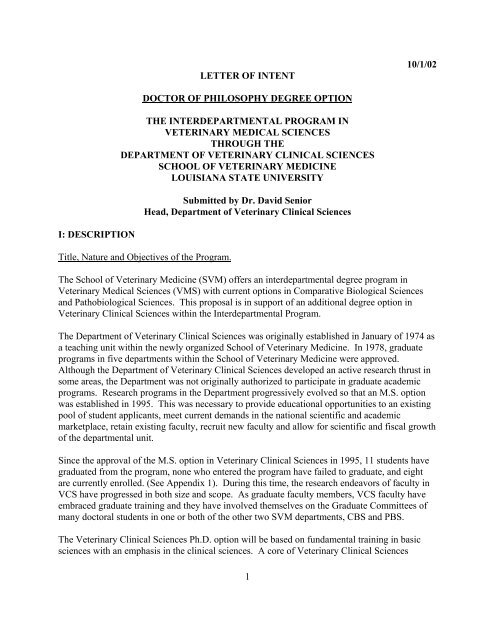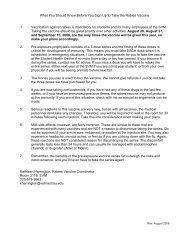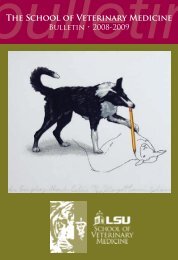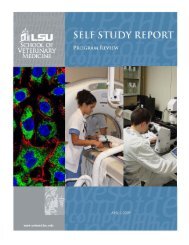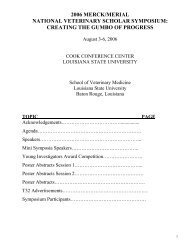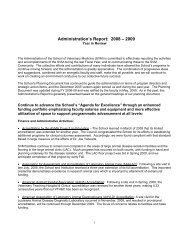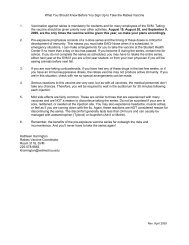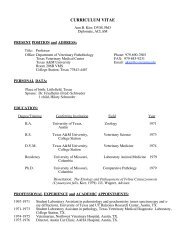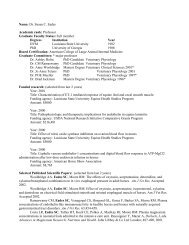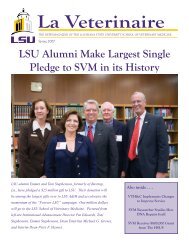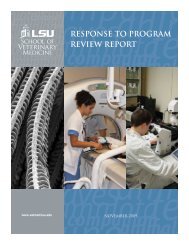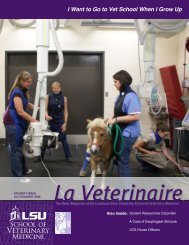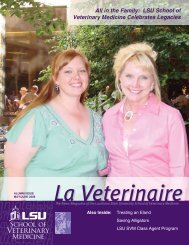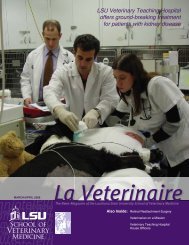10/1/02 letter of intent doctor of philosophy degree option the ...
10/1/02 letter of intent doctor of philosophy degree option the ...
10/1/02 letter of intent doctor of philosophy degree option the ...
- No tags were found...
Create successful ePaper yourself
Turn your PDF publications into a flip-book with our unique Google optimized e-Paper software.
Interdepartmental Program. While many <strong>of</strong> <strong>the</strong> past Ph.D. students affiliated with VCSwere well served by participating in course work and research projects in o<strong>the</strong>rdepartments <strong>of</strong> <strong>the</strong> School <strong>of</strong> Veterinary Medicine, <strong>the</strong>se o<strong>the</strong>r Veterinary MedicalSciences (VMS) concentrations are not as well positioned with faculty expertise toprovide training in clinical research.2) To meet <strong>the</strong> demand for candidates who wish to undertake Ph.D. studies in VeterinaryClinical Sciences. (Appendix 2)3) To provide greater opportunity for emphasis on clinical research for studentsundertaking graduate study in o<strong>the</strong>r Veterinary Medical Sciences concentrations ando<strong>the</strong>r LSU graduate programs.4) To enhance <strong>the</strong> academic tenor <strong>of</strong> <strong>the</strong> Department <strong>of</strong> Veterinary Clinical Sciences.5) Provides VCS faculty <strong>the</strong> opportunity to mentor Ph.D. students with more autonomyand flexibility.Final Note: We have aggressively attempted to establish very high visibility for our departmentby participation in major national and international scientific and pr<strong>of</strong>essional meetings andorganizations. We have continued to recruit new, highly skilled young faculty, most <strong>of</strong> whomtrained in combined residency/graduate programs. We are emerging as a real force in <strong>the</strong>clinical sciences with a reputation for an energetic and focused program. Our Apresence@ as aquality program is becoming established (Appendix 4). The recognition <strong>of</strong> an area <strong>of</strong>concentration in VCS under <strong>the</strong> Veterinary Medical Sciences umbrella graduate program at <strong>the</strong>Ph.D. level represents a fur<strong>the</strong>r step in this development.Proposed DegreeDoctor <strong>of</strong> Philosophy in <strong>the</strong> Veterinary Clinical Sciences <strong>option</strong> <strong>of</strong> <strong>the</strong> InterdepartmentalProgram in Veterinary Medical Sciences.3
II: NEEDA. Potential Program Duplication.No similar program has been <strong>of</strong>fered at this institution previously.B. Competing Programs.No similar program is <strong>of</strong>fered at any o<strong>the</strong>r institution in Louisiana. However, severalo<strong>the</strong>r Veterinary Schools (3) in <strong>the</strong> United States <strong>of</strong>fer <strong>doctor</strong>al <strong>degree</strong>s in VeterinaryClinical Sciences.C. Basis for Program Development. If similar programs exist in Louisiana, why isan additional program needed? Indicate manpower needs, including interest on <strong>the</strong> part<strong>of</strong> industry, academia, governmental agencies, or o<strong>the</strong>r institutions.Currently, o<strong>the</strong>r departments in <strong>the</strong> School <strong>of</strong> Veterinary Medicine <strong>of</strong>fer limited opportunity tostudy and perform clinical research at <strong>the</strong> Ph.D. level. The VCS concentration allowsparticipation <strong>of</strong> Ph.D. candidates in clinical research which has several unique aspects. To besuccessful, clinical research requires special design because control groups <strong>of</strong>ten cannot becontrived as in bench research and outcomes can be so variable because one is dealing withcomplex spontaneous disease. Specific examples <strong>of</strong> unique approaches in clinical researchinclude: diagnosis and characterization <strong>of</strong> spontaneous animal models <strong>of</strong> human disease;identification and selection <strong>of</strong> suitable cohort populations to develop a basis for comparison <strong>of</strong>populations; principle component analysis to determine <strong>the</strong> relative importance <strong>of</strong> several riskfactors when a disease has multifactorial etiology; and variability <strong>of</strong> predictive value dependingon disease prevalence and o<strong>the</strong>r test results that narrow population selection. These examplesserve to illustrate some unique aspects <strong>of</strong> experimental design in clinical research and <strong>the</strong> VCSconcentration provides <strong>the</strong> appropriate perspective for Ph.D. candidates in this field.Appended is a copy <strong>of</strong> <strong>the</strong> most recent departmental report (2001-2), which gives an indication<strong>of</strong> <strong>the</strong> scope <strong>of</strong> clinical research performed by faculty in VCS. For <strong>the</strong> most part, o<strong>the</strong>rdepartments in <strong>the</strong> School <strong>of</strong> Veterinary Medicine <strong>of</strong>fering concentrations under <strong>the</strong> VMSumbrella Ph.D. program do not participate in clinical research and <strong>the</strong> addition <strong>of</strong> <strong>the</strong> VCSconcentration will fill that void. In addition, it is anticipated that faculty expertise in o<strong>the</strong>rdepartments <strong>of</strong> <strong>the</strong> SVM will fur<strong>the</strong>r bolster <strong>the</strong> strength <strong>of</strong> this new <strong>option</strong>.The range <strong>of</strong> required courses listed in <strong>the</strong> VCS concentration includes many courses <strong>of</strong>fered byo<strong>the</strong>r LSU departments because <strong>the</strong>se courses are well suited to <strong>the</strong> needs <strong>of</strong> our graduatestudents. This aspect fur<strong>the</strong>r reinforces <strong>the</strong> fact that <strong>the</strong> VCS concentration does not represent<strong>the</strong> establishment <strong>of</strong> a new <strong>degree</strong> program. This combination <strong>of</strong> opportunities <strong>of</strong>fered in <strong>the</strong>School <strong>of</strong> Veterinary Medicine=s graduate <strong>degree</strong> programs is in line with <strong>the</strong> current trend awayfrom redundant, Alow completer@ programs and works toward <strong>the</strong> establishment <strong>of</strong> a AOneUniversity@ concept with shared resources.4
1. State, Regional, and National Need in <strong>the</strong> Field for More Graduates.The Department=s research and teaching strengths relate to disciplines that are in need <strong>of</strong>individuals with additional training in clinical research. Fur<strong>the</strong>r, faculty in <strong>the</strong> Department arecommitted to applying contemporary research techniques to clinical problems. The Ph.D. <strong>option</strong>would allow us to train much needed veterinary researchers to fill governmental, academic andindustrial positions. The proposed Ph.D. <strong>option</strong> would focus on <strong>the</strong> clinical sciences to insurethat <strong>the</strong> graduates are equipped to understand disciplines that will be <strong>the</strong> foundation <strong>of</strong> veterinaryclinical research in <strong>the</strong> twenty-first century. We know that we are in a unique position to providea qualified pool <strong>of</strong> graduates to help streng<strong>the</strong>n future scientific work and veterinary medicine inLouisiana and <strong>the</strong> United States.The program in Veterinary Clinical Sciences is unique because it exposes students to researchproblems that are directly related to clinical problems. This interface <strong>of</strong> research and clinicalsciences provides avenues for new and exciting projects and opportunities for research fundingfrom private foundations, industry, and federal agencies.2. Possibilities for Cooperative Programs.A formal cooperative <strong>degree</strong> program is not possible since no o<strong>the</strong>r institution in Louisiana canprovide <strong>the</strong> requisite expertise to train veterinary clinicians with a strong background in clinicalsciences. However, collaborative arrangements with o<strong>the</strong>r departments in <strong>the</strong> SVM willcomplement and streng<strong>the</strong>n <strong>the</strong> clinical research training <strong>of</strong> graduate students. Existing graduatecourses will also be utilized to complement specific research training within <strong>the</strong> Department.Clinical faculty in <strong>the</strong> Department routinely collaborate on research projects with faculty at anumber <strong>of</strong> institutions both inside and outside <strong>of</strong> <strong>the</strong> state. For example, faculty are currentlycollaborating with faculty at Louisiana Agricultural Experimental Station (LAES), The AudubonCenter for Research <strong>of</strong> Endangered Species, Louisiana State University (LSU) Medical Center inNew Orleans, Pennington Biomedical Research Center, and Delta Regional Primate Center.These interactions are expected to complement and enrich <strong>the</strong> quality <strong>of</strong> research trainingprovided by <strong>the</strong> proposed program.The Department also has selectively pursued faculty and physicians involved in complementaryactivities for nomination as adjunct pr<strong>of</strong>essors. These individuals are expected to contribute to<strong>the</strong> graduate program by presenting lectures on biomedical research to graduate students enrolledin <strong>the</strong> proposed <strong>option</strong>.Similarly, <strong>the</strong>re are research disciplines on <strong>the</strong> Baton Rouge and New Orleans, Louisiana StateUniversity campuses that will complement our training programs by <strong>of</strong>fering courses to facilitatetraining <strong>of</strong> residency/graduate students in specific areas <strong>of</strong> departmental research. For example,<strong>the</strong> LSU Baton Rouge campus currently has graduate programs in neurobiology, endocrinology,microbiology, veterinary microbiology and parasitology, veterinary physiology, pharmacology5
and toxicology, veterinary pathology and cell and molecular biology. Some <strong>of</strong> <strong>the</strong> courses<strong>of</strong>fered in <strong>the</strong>se programs will be useful to graduate students in <strong>the</strong> Veterinary Clinical Sciences<strong>option</strong>. The availability <strong>of</strong> courses and expertise in o<strong>the</strong>r <strong>option</strong>s <strong>of</strong> <strong>the</strong> Veterinary MedicalSciences Ph.D. program allows <strong>the</strong> Department to <strong>of</strong>fer a broad base to fulfill <strong>the</strong> need <strong>of</strong>individual programs and <strong>the</strong> existing programs support our established and developing graduatecourses.New courses will be developed and existing courses redesigned to meet <strong>the</strong> needs <strong>of</strong> graduatestudents in <strong>the</strong> Veterinary Clinical Sciences <strong>option</strong>. Existing course opportunities will beredesigned to better meet our objectives and to streng<strong>the</strong>n areas <strong>of</strong> study previouslyunderdeveloped by o<strong>the</strong>r graduate study <strong>option</strong>s within <strong>the</strong> School <strong>of</strong> Veterinary Medicine. Thus<strong>the</strong> addition <strong>of</strong> <strong>the</strong> Veterinary Clinical Sciences <strong>option</strong> will streng<strong>the</strong>n <strong>the</strong> already wellestablished Veterinary Medical Sciences Ph.D. program.The proposed graduate <strong>option</strong> will utilize <strong>the</strong> aforementioned resources to design programs <strong>of</strong>study for individual Ph.D. candidates. The Veterinary Clinical Sciences Ph.D. <strong>option</strong> will beunique because <strong>of</strong> its clinical nature and courses <strong>of</strong> study will better serve to meet <strong>the</strong> needs <strong>of</strong>our students than under <strong>the</strong> present system. VCS Ph.D. students will address a number <strong>of</strong> basicand applied research areas based on funded projects within <strong>the</strong> Department.6
PART IV: FACULTYA. Credentials <strong>of</strong> <strong>the</strong> Departmental Faculty. (Appendix 4)FULL MEMBERS OF THE GRADUATE FACULTY:Jill M. Blackmer, DVM., MS, Pr<strong>of</strong>essor; Dipl. AVCIM, Dipl ABVPDaniel J. Burba, DVM, Associate Pr<strong>of</strong>essor, Dipl. ACVSSusan C, Eades, DVM, PhD, Pr<strong>of</strong>essor, Dipl. ACVIMBruce E. Eilts, DVM, MS, Pr<strong>of</strong>essor, Dipl. ACTCarol S. Foil, DVM, Pr<strong>of</strong>essor, Dipl. ACVDCheryl S. Hedlund, DVM, MS, Pr<strong>of</strong>essor, Dipl. ACVSGiselle Hosgood, BVSc, MS, Pr<strong>of</strong>essor, Dipl. ACVS, Fellow ACVSRustin M Moore, DVM, PhD, Pr<strong>of</strong>essor, Dipl. ACVST. Mark Neer, DVM, Pr<strong>of</strong>essor, Dipl. ACVIMDale L. Paccamonti, DVM, MS, Pr<strong>of</strong>essor, Dipl ACTDavid F. Senior, BVSc, Pr<strong>of</strong>essor, Dipl. ACVIM, Dipl. ECVIM-CAJoseph Taboada, DVM, Pr<strong>of</strong>essor, Dipl ACVIMThomas N. Tully, DVM, MS, Pr<strong>of</strong>essor, Dipl ABVPASSOCIATE MEMBERS OF THE GRADUATE FACULTY:Loretta Bubenik, DVM, MS, Assistant Pr<strong>of</strong>essor, Dipl. ACVS (pending)Jacqueline R. Davidson, DVM, MS, Associate Pr<strong>of</strong>essor, Dipl. ACVSSusan Eddlestone, DVM, Assistant Pr<strong>of</strong>essor, Dipl. ACVS (pending)Adolfo Garcia, DVM, MS, PhD, Associate Pr<strong>of</strong>essor, Dipl. LA-CVO (pending)Marjorie S. Gill, DVM, MS, Associate Pr<strong>of</strong>essor, Dipl. ABVPAmy M. Grooters, DVM, Dipl. ACVIM (pending)Jeremy D. Hubert, BVSc, MS, Assistant Pr<strong>of</strong>essor, Dipl. ACVSSusanne Lauer, BVM, Dr.med.vet., Assistant Pr<strong>of</strong>essor (pending)Glenna E. Mauldin, DVM, MS, Assistant Pr<strong>of</strong>essor, Dipl. ACVIMG. Neal Mauldin, DVM, Assistant Pr<strong>of</strong>essor, Dipl. ACVR (RO), Dipl. ACVIM (O,IM)(pending)Mark Mitchell, DVM, PhD, Assistant Pr<strong>of</strong>essor (pending)Rebecca S. McConnico, DVM, PhD, Assistant Pr<strong>of</strong>essor, Dipl. ACVIMClaudio Natalini, DVM, MS, PhD, Assistant Pr<strong>of</strong>essor (pending)Glenn Pettifer, DVM, DVSc, Assistant Pr<strong>of</strong>essor, Dipl. ACVA (pending)Santos Ramirez, DVM, MS, Assistant Pr<strong>of</strong>essor (pending)Keith Strickland, DVM, Assistant Pr<strong>of</strong>essor, Dipl. ACVIM (C) (pending)H. Ame Walesby, DVM, MS, Assistant Pr<strong>of</strong>essor, Dipl. ACVSSUPPORTING CLINICAL FACULTY:Ralph E. Beadle, DVM, PhD, Pr<strong>of</strong>essor EmeritusDennis French, DVM, Pr<strong>of</strong>essor, Dipl. ABVPAmong <strong>the</strong> VCS faculty members listed above, eight have a <strong>doctor</strong>ate as <strong>the</strong>ir terminal8
<strong>degree</strong> and 13 have an M.S.. The nature <strong>of</strong> specialty training in <strong>the</strong> clinical veterinary medicineis different in many respects from <strong>the</strong> training required in o<strong>the</strong>r LSU departments. The insightsgained by specialty training combined with an M.S. in <strong>the</strong> clinical sciences provides anadditional unique perspective to clinical research. This situation is analagous to that in <strong>the</strong> field<strong>of</strong> human medicine where <strong>the</strong> <strong>doctor</strong>ate <strong>degree</strong> is not a necessity for effective research training.Many VCS faculty with M.S. as <strong>the</strong> terminal <strong>degree</strong> are well qualified to serve as majorpr<strong>of</strong>essors in <strong>the</strong> VCS <strong>option</strong> <strong>of</strong> <strong>the</strong> Interdepartmental program.B. Calculated Student/Faculty Ratios.Clinical faculty currently teach 345-350 pr<strong>of</strong>essional and graduate students per year.This would be expected to increase to 350-355 students per year based on interest inpursuing a PhD <strong>degree</strong> in <strong>the</strong> VCS concentration. There are currently 42 facultyemployed in VCS for an anticipated student/faculty ratio <strong>of</strong> 8.5:1.C. Faculty Additions.The proposed program will be absorbed in whole by present faculty. New faculty willnot be added to accommodate <strong>the</strong> PhD concentration in VCS. Faculty currently involvedin graduate studies in o<strong>the</strong>r <strong>option</strong>s within Veterinary Medical Sciences will redirect <strong>the</strong>irenergies to <strong>the</strong> VCS <strong>option</strong>. VCS faculty currently involved in research will recruitstudents into <strong>the</strong> PhD program. This will not alter existing instructional responsibilitiesbecause <strong>the</strong>se individuals are already teaching PhD candidates who happen to be in o<strong>the</strong>rdepartments but who would transfer into <strong>the</strong> VCS concentration. Fur<strong>the</strong>rmore, over <strong>the</strong>last 5 years, recruitment <strong>of</strong> faculty to replace attrition has resulted in an increase in <strong>the</strong>proportion <strong>of</strong> VCS faculty with research and graduate studies experience.GRADUATE STUDIES IN VETERINARY CLINICAL SCIENCESOBJECTIVESThe School <strong>of</strong> Veterinary Medicine <strong>of</strong>fers <strong>the</strong> Doctor <strong>of</strong> Philosophy (Ph.D.) <strong>degree</strong> in VeterinaryMedical Sciences. Under this umbrella, <strong>the</strong> Department <strong>of</strong> Veterinary Clinical Sciences <strong>of</strong>fers aVeterinary Clinical Science <strong>option</strong> at both <strong>degree</strong> levels. Opportunities are available for studentsholding <strong>the</strong> D.V.M. or equivalent <strong>degree</strong>. Advanced training in Veterinary Clinical Sciences at<strong>the</strong> Ph.D. level is designed to prepare students for advanced placement in academia, in industryand in <strong>the</strong> private sector.Clinical faculty members have abilities and interests in many facets <strong>of</strong> veterinary clinical scienceas <strong>the</strong>se relate to all domestic and exotic species. Departmental facilities, faculty training andcollaboration with o<strong>the</strong>r departments in <strong>the</strong> School <strong>of</strong> Veterinary Medicine allow study planswith topics in most aspects <strong>of</strong> veterinary clinical science. There is also a working relationshipwith faculty in <strong>the</strong> Pennington Biomedical Research Center and <strong>the</strong> Louisiana AgriculturalExperiment Station. Departmental instructional responsibilities provide opportunities forresidency/graduate students to acquire teaching experience. Close alliance <strong>of</strong> VCS with o<strong>the</strong>r9
SVM departments provides latitude in <strong>the</strong> design <strong>of</strong> study plans or special problems that mayencompass specialties such as oncology, cardiology, radiation medicine, immunology, geneticstudies, surgery, internal medicine, radiology, dermatology, ophthalmology, <strong>the</strong>riogenology orpathology.GRADUATE DEGREE PROGRAM OVERVIEWAcceptance <strong>of</strong> Ph.D. students is <strong>the</strong> prerogative <strong>of</strong> <strong>the</strong> graduate faculty <strong>of</strong> <strong>the</strong> Veterinary ClinicalSciences department. Academic qualifications, availability <strong>of</strong> funds, and assignable facilitiesand <strong>the</strong> clinical faculty are factors considered when admitting students. To qualify academically,an applicant for graduate studies must have a D.V.M. or equivalent <strong>degree</strong> from an accreditedinstitution. In addition, <strong>the</strong> applicant should have attained a grade point average <strong>of</strong> 3.00 basedon a 4.00 grading system and a combined verbal and quantitative GRE score <strong>of</strong> <strong>10</strong>00 or better.Students with less than this grade point average or <strong>the</strong>se GRE scores may be considered andadmitted on a probationary basis if recommended by <strong>the</strong> graduate faculty <strong>of</strong> <strong>the</strong> department.Students admitted on probation will remain in this status until completion <strong>of</strong> 9 hours <strong>of</strong> graduatelevelcourse work with at least a 3.00 grade point average. Students on probation may not holdassistantships or fellowships. All candidates must be fluent in English. International studentsmust also have a TOEFL score <strong>of</strong> at least 550.Study plans for students pursuing <strong>the</strong> Ph.D. <strong>degree</strong> <strong>option</strong> are flexible and are designed toprovide <strong>the</strong> graduate student with a broad background in <strong>the</strong> fundamental sciences <strong>of</strong> clinicalveterinary medicine. Specialization at <strong>the</strong> Ph.D. level can be achieved through a study plan thatis developed with <strong>the</strong> advice <strong>of</strong> a major pr<strong>of</strong>essor and an advisory committee. Study plans mayinclude, but are not limited to, <strong>the</strong> following advanced courses in: statistics, surgery, internalmedicine, experimental research design, biochemistry, microscopic and macroscopic anatomy,and pathology, and pathophysiology. Students pursuing <strong>the</strong> Ph.D. <strong>degree</strong> are expected to attendand participate in departmental seminars whenever <strong>the</strong>se are <strong>of</strong>fered.A research dissertation is required for all <strong>doctor</strong>al <strong>degree</strong> candidates. Dissertation researchwithin <strong>the</strong> department may encompass certain aspects <strong>of</strong> dermatology, ophthalmology,reproduction, endocrinology, drug metabolism and disposition, hematology, clinical toxicology,nutrition, respiratory physiology, clinical pharmacology, surgery, cardiology, internal medicine,oncology, radiation <strong>the</strong>rapy and o<strong>the</strong>r areas. Each student will be required to submit at least onemanuscript based on research to a refereed journal before completing <strong>the</strong> program.<strong>10</strong>
DOCTOR <strong>of</strong> PHILOSOPHY PROGRAMThe Department <strong>of</strong> Veterinary Clinical Sciences Ph.D. program will be administered under <strong>the</strong>Veterinary Medical Sciences umbrella program <strong>of</strong> <strong>the</strong> School <strong>of</strong> Veterinary Medicine. Theguidelines and standards for this program will at least meet <strong>the</strong> minimum requirements described in<strong>the</strong> Graduate School catalog. The VCS Ph.D. program description will indicate where <strong>the</strong>re aredifferent (higher standards) requirements.Program <strong>of</strong> Study: A program <strong>of</strong> study must be submitted to <strong>the</strong> VCS Graduate AffairsCommittee, VCS Department Head and <strong>the</strong> Graduate School during <strong>the</strong> student=s secondsemester in residence following selection <strong>of</strong> a major pr<strong>of</strong>essor. The program <strong>of</strong> study details <strong>the</strong>course work <strong>the</strong> GAC recommends <strong>the</strong> graduate school requires <strong>of</strong> <strong>the</strong> student. No student willbe permitted to register for a third semester without having submitted a departmental approvedprogram <strong>of</strong> study to <strong>the</strong> Graduate School.Course requirements: The Graduate School has no specific course work requirements for <strong>the</strong> Ph.D.<strong>degree</strong>. However, sufficient course work, equivalent to at least three years full-time study at <strong>the</strong> courselevel <strong>of</strong> 4000 or above, is expected. The course work, in conjunction with research training, will provide<strong>the</strong> student with <strong>the</strong> skills needed for continuing research independent <strong>of</strong> <strong>the</strong> major pr<strong>of</strong>essor. The VCScourse work requirements are as follows:Requirementsat least 14 credits <strong>of</strong> VCS coursesat least two statistic courses (minimum <strong>of</strong> 6 credits)at least 3 credits <strong>of</strong> VCS 7001 (max <strong>of</strong> 4)at least 3 credits VCS 70<strong>10</strong> (max <strong>of</strong> 4)a maximum <strong>of</strong> 6 hours VCS 7003VMED 7004 (2 credits)a minimum <strong>of</strong> 12 hours research (VMED 8900, 9000) with a maximum <strong>of</strong> 24 hoursIf a minor is selected, <strong>the</strong> course work must meet <strong>the</strong> minor requirements <strong>of</strong> that department.14 credits VCS Graduate Courses 7000 or above (e.g. 4@VCS 70<strong>10</strong>, 4@VCS7001, 6@VCS7003)2 credits VMED 70048 credits Statistics courses (2 courses B credits range 6-8)12 credits Elective courses24 credits Research (VMED 8900/9000)-----------60 credits Total11
VCS Departmental Graduate Courses (each student must take a minimum <strong>of</strong> 14 credit hours):COURSE # CREDITS OFFERED TITLEVCS 7001 1 (max. <strong>of</strong> 4 cr.) F,S Seminar: Veterinary Clinical SciencesVCS 7003 1-4 (max. <strong>of</strong> 6 cr.) F,S,Su Special Topics in Clinical Veterinary MedicineVCS 7201 2 V (S) Veterinary GastroenterologyVCS 72<strong>02</strong> 1 F,S Veterinary Surgical TechniquesVCS 7204 2 V(F) Advanced Veterinary OrthopedicsVCS 7205 2 V(F) Advanced Veterinary Clinical NeurologyVCS 7206 2 V (S) Advanced Veterinary Urogenital DiseasesVCS 7208 2 V(F) Advanced Veterinary Cardiovascular DiseasesVCS 7209 2 V (S) Advanced Veterinary Respiratory DiseasesVCS 72<strong>10</strong> 1 (max 4) F,S,Su Veterinary Scientific Journal ReviewVCS 7003 2 Su Veterinary Scientific WritingVCS 7003 2 F Advanced Principles <strong>of</strong> SurgeryVCS 72xx Proposed Course Advanced Bioscience Research TechniquesVCS 72xx Proposed Course Advanced Large Animal Anes<strong>the</strong>siaVCS 72xx Proposed Course Advanced Small Animal Anes<strong>the</strong>siaVCS 72xx Proposed Course Advanced Exotic Animal Anes<strong>the</strong>siaVCS 72xx Proposed Course Veterinary Clinical Experimental DesignVCS 72xx Proposed Course Veterinary Clinical EpidemiologyVCS Graduate Seminar Series (each student must take a minimum <strong>of</strong> 3 and a maximum <strong>of</strong> 4seminar courses):COURSE # CREDITS OFFERED TITLEVCS 7001 1 (max. <strong>of</strong> 4 cr.) F,S Seminar: Veterinary Clinical SciencesVCS Graduate Special Topic Courses (max <strong>of</strong> 6 credit hours can count toward VCS courses):COURSE # CREDITS OFFERED TITLEVCS 7003 1-4 (max. <strong>of</strong> 8 cr.) F,S,Su Special Topics in Clinical Veterinary MedicineDissertation Research (each student must take a minimum <strong>of</strong> 12 credit hours):COURSE # CREDITS OFFERED TITLEVMED 8900 Variable F, S, Su Predissertation ResearchVMED 9000 Variable F, S, Su Dissertation ResearchStatistical Analyses (each student must take a minimum <strong>of</strong> two courses/6-8 credit hours):COURSE # CREDITS OFFERED TITLEEXST 7003 4 F, S Statistical InferenceEXST 7004 4 F, S Experimental Statistics IEXST 7005 4 F, S Statistical Techniques IEXST 7012 3 Fundamental Sampling TechniquesEXST 7013 4 Statistical Inferences II12
EXST 7014 4 Experimental Statistics IIEXST 7015 4 Statistical Techniques IIEXST 7031 3 S Experimental DesignEXST 7034 3 Regression AnalysisEXST 7036 3 Categorical Data AnalysisEXST 7037 3 Multivariate StatisticsSuggested Graduate Elective Courses:COURSE # CREDITS OFFERED TITLEVMED 7004 2 F Introduction to ResearchVMED 8900 Variable F, S, Su Predissertation ResearchVMED 9000 Variable F, S, Su Dissertation ResearchPBS 7423 3 Cellular and Molecular ImmunologyPBS 7432 3 Cell and Organ Culture Techniques in BioresearchPBS 7411 3 Molecular Mechanisms <strong>of</strong> Viral PathogenesisPBS 7417 3 Immune Response to Infect/Parasitic AgentsPBS 7404 3 Pathogenic Mechanisms <strong>of</strong> BacteriaPBS 7312 2 Epidemiological Study DesignPBS 7525 2-4 Veterinary Clinical HematologyPBS 7526 2-4 Veterinary Clinical ChemistryPBS 7527 2-4 Veterinary Clinical CytologyCBS 7<strong>10</strong>5 3 Ultrastructural CytologyCBS 7<strong>10</strong>6 3 Electron Microscopy: Vet Med ApplicationCBS 7<strong>10</strong>9 1-3 Advanced Macroscopic AnatomyCBS 7112 1-3 Advanced Microscopic AnatomyCBS 7122 3 Veterinary NeuroscienceCBS 7607 3 Advanced Respiratory PhysiologyCBS 7605 3 Circulatory Transport and ControlCBS 7615 3 Pulmonary PharmacologyCBS 7617 3 Autonomic Nervous SystemCBS 7628 3 Veterinary Physiology ICBS 7629 3 Veterinary Physiology IICBS 7630 3 Veterinary PharmacologyCBS 7631 3 Veterinary NeuroscienceQBCH 4087 4 Basic BiochemistryBCH 4093 3 General Biochemistry IBCH 4094 3 General Biochemistry IISeminar Requirements: Ph.D. students are required to present at least three announced, scheduledseminars during <strong>the</strong>ir tenure. One <strong>of</strong> <strong>the</strong>se seminars must formally present <strong>the</strong> student=s researchproposal and one would be for presentation <strong>of</strong> <strong>the</strong> results <strong>of</strong> <strong>the</strong> dissertation research as part <strong>of</strong> <strong>the</strong>final examination. The o<strong>the</strong>r seminar may be on a topic approved by <strong>the</strong> student=s GAC. Ph.D.students are required to register for VCS Seminar (VCS 7001), when <strong>of</strong>fered, and a roll will be takenfor attendance. Students may also be asked to prepare and present articles in a journal club formatand will be graded on <strong>the</strong>ir skills and level <strong>of</strong> participation in such presentations.13
Research Proposal: It is recommended that candidates write a research proposal which clearlyoutlines <strong>the</strong>ir program <strong>of</strong> study and <strong>the</strong> specific experiments to be performed. This should beprepared as early as possible so that <strong>the</strong> GAC may review <strong>the</strong> proposal in order to contribute to <strong>the</strong>quality <strong>of</strong> <strong>the</strong> student=s training.The General Examination: The general examination is administered by <strong>the</strong> GAC and a member(s)appointed by <strong>the</strong> Dean <strong>of</strong> <strong>the</strong> Graduate School. The exam is conducted in accordance withrequirements <strong>of</strong> <strong>the</strong> Graduate School and may consist <strong>of</strong> written and oral components or may besolely oral. The department requires that <strong>the</strong> student be examined orally whereas <strong>the</strong> major pr<strong>of</strong>essoris responsible for notifying <strong>the</strong> student as to whe<strong>the</strong>r a written examination will also be required. It is<strong>the</strong> sole <strong>option</strong> <strong>of</strong> <strong>the</strong> major pr<strong>of</strong>essor to require a written exam and <strong>the</strong> student must be formallynotified <strong>of</strong> this requirement in <strong>the</strong> first semester <strong>of</strong> study. Format <strong>of</strong> written examinations isdetermined by <strong>the</strong> major advisor. The subject areas covered on <strong>the</strong> latter exam may include all those<strong>of</strong> concern to <strong>the</strong> examining committee members.The Dissertation and Final Examination: The dissertation and final examination must demonstratea mastery <strong>of</strong> research techniques and <strong>the</strong> ability to conduct original and independent research thatleads to a significant, publishable contribution to <strong>the</strong> field. The final examination committee usuallyconsists <strong>of</strong> <strong>the</strong> GAC and a designated graduate faculty representative chosen by <strong>the</strong> Dean <strong>of</strong> <strong>the</strong>Graduate School. This committee is usually <strong>the</strong> same one that participates in <strong>the</strong> generalexamination.The final examination consists <strong>of</strong> three components: (1) a critical evaluation <strong>of</strong> <strong>the</strong> Dissertation asprovided for in <strong>the</strong> Graduate School catalog; (2) an oral presentation <strong>of</strong> <strong>the</strong> results <strong>of</strong> <strong>the</strong> candidatesoriginal research in a seminar advertised within <strong>the</strong> School <strong>of</strong> Veterinary Medicine as well as an oralexamination <strong>of</strong> <strong>the</strong> candidate by <strong>the</strong> candidate=s GAC and graduate faculty appointed by <strong>the</strong> Dean <strong>of</strong><strong>the</strong> Graduate School. The subject areas covered on <strong>the</strong> latter exam may include all those <strong>of</strong> concernto <strong>the</strong> examining committee members.The format <strong>of</strong> <strong>the</strong> dissertation will be decided by <strong>the</strong> major pr<strong>of</strong>essor and GAC following guidelinesoutlined in <strong>the</strong> Graduate School catalog.Graduate Advisory Committee (GAC)The <strong>doctor</strong>al Graduate Advisory Committee (GAC) mustinclude a minimum <strong>of</strong> 4 members <strong>of</strong> <strong>the</strong> graduate faculty, including <strong>the</strong> major pr<strong>of</strong>essor, who acts aschair. At least two members <strong>of</strong> <strong>the</strong> GAC must be from VCS. One VCS faculty member will serve asmajor pr<strong>of</strong>essor and chair. In accordance with LSU Graduate School guidelines, <strong>the</strong> major pr<strong>of</strong>essormust be a full member <strong>of</strong> <strong>the</strong> graduate faculty with <strong>the</strong> highest <strong>degree</strong> appropriate to <strong>the</strong> field orunquestionable evidence <strong>of</strong> comparable achievement in <strong>the</strong> field. An associate member can serve asa major pr<strong>of</strong>essor if <strong>the</strong> committee includes at least one full member <strong>of</strong> <strong>the</strong> graduate faculty fromVCS (LSU Graduate Bulletin 20<strong>02</strong>-2003, page 129). Associate and full graduate faculty members inVCS can apply to <strong>the</strong> VCS Graduate Faculty to serve as sole chair (major pr<strong>of</strong>essor) <strong>of</strong> a <strong>doctor</strong>aladvisory committee after <strong>the</strong>y have first served on or witnessed 2 <strong>doctor</strong>al examinations. Criteria forapproval as sole advisors by <strong>the</strong> VCS Graduate Faculty will include scientific credentials such aspublications, quality <strong>of</strong> research program, success in grant acquisition and academic recognition.14
Indicate if federal or o<strong>the</strong>r sources <strong>of</strong> funds are available. Are <strong>the</strong>re prospects for increasedincome from students recruited specifically to <strong>the</strong> program who o<strong>the</strong>rwise would not haveenrolled?The proposed program will not require additional allocations. Graduate students will besupported by funds already used by <strong>the</strong> department and student applicants are eligible to competefor financial support awarded by <strong>the</strong> School <strong>of</strong> Veterinary Medicine and Louisiana StateUniversity. Tuition will be generated from students who will be attracted to <strong>the</strong> newlydeveloped program.A:\dfs25\acad\PhDLetter<strong>of</strong> Intent.wpd16


